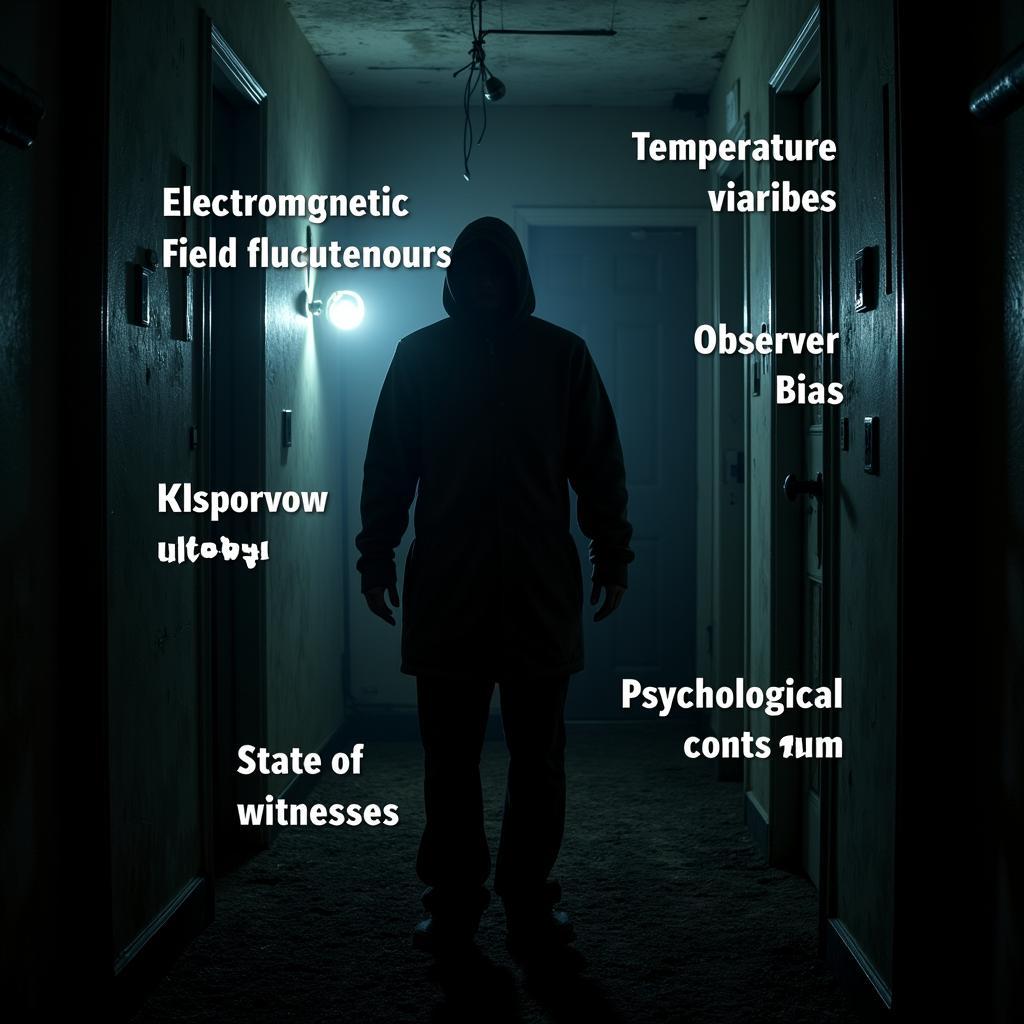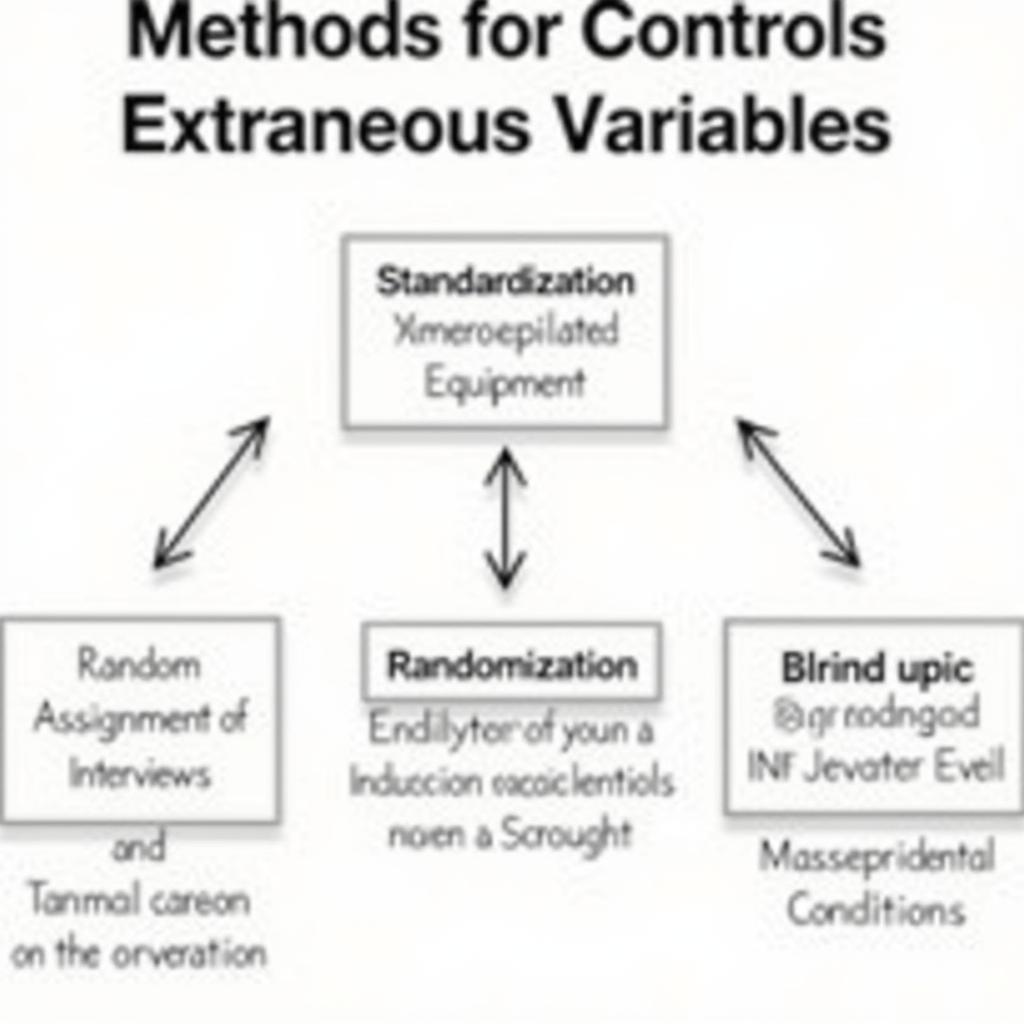Extraneous variables in research can significantly impact the outcome of any investigation, especially in the already complex field of paranormal research. These unwanted guests can creep into our meticulously planned experiments, skewing our results and leading us down the wrong path. Understanding and controlling these variables is crucial for obtaining reliable and meaningful data. Read on to learn more about these hidden influencers and how to mitigate their effects.
As paranormal investigators, we strive to understand the unknown. We formulate hypotheses, design experiments, and collect data. But what happens when unforeseen factors interfere with our research? These “extraneous variables” can range from environmental conditions to participant biases, potentially jeopardizing the validity of our findings. This article delves into the fascinating world of extraneous variables, exploring their various forms, their potential impact on paranormal research, and effective strategies to minimize their influence. This way we can conduct more rigorous and trustworthy investigations. For other research insights, check out goals of psychology research.
Types of Extraneous Variables in Paranormal Research
Extraneous variables can be categorized in several ways, helping us to better understand their nature and origin. Let’s explore some key distinctions:
Situational Variables
These are environmental factors that can affect the research setting. In paranormal investigations, this could include temperature fluctuations, electromagnetic fields, or even the presence of other individuals. Imagine investigating a purportedly haunted location: a sudden drop in temperature, unrelated to the alleged paranormal activity, could be misinterpreted as a ghostly manifestation.
Participant Variables
These relate to the characteristics of the individuals involved in the study, both investigators and those experiencing the phenomena. Preconceived beliefs, psychological states, and even physiological conditions can influence perceptions and interpretations of events. A skeptical investigator might dismiss genuine phenomena, while a highly suggestible individual might misinterpret ordinary occurrences as paranormal.
Experimenter Variables
These stem from the researchers themselves. Their expectations, biases, and even subtle cues can unintentionally influence the participants and the outcome of the study. An investigator eager to prove the existence of ghosts might inadvertently guide witnesses towards confirming their beliefs.
 Extraneous Variables in Paranormal Investigation
Extraneous Variables in Paranormal Investigation
Controlling Extraneous Variables
Minimizing the impact of extraneous variables is essential for conducting sound paranormal research. Here are some effective strategies:
-
Standardization: Implement standardized procedures for data collection and analysis. This ensures consistency across investigations and reduces the influence of individual biases. For example, using calibrated equipment and predetermined interview questions can help minimize variability.
-
Randomization: Assign participants randomly to different conditions or groups. This helps distribute individual differences evenly, reducing the chance that participant variables will systematically skew the results. For instance, randomly assigning investigators to different locations or times within a larger investigation can help control for individual biases.
-
Blinding: Keep participants and investigators unaware of certain aspects of the study to reduce the impact of expectations. For instance, in EVP analysis, having independent listeners who are unaware of the context of the recordings can reduce bias in interpretation.
 Controlling Extraneous Variables in Paranormal Research
Controlling Extraneous Variables in Paranormal Research
How Does This Apply to Psychological Research?
Understanding extraneous variables is critical in psychological research as well. Learn more about in psychological research a confederate is and research methods used in psychology. These concepts provide a strong foundation for understanding the importance of controlling variables in any research endeavor.
Why are Extraneous Variables Important to Consider?
Extraneous variables can lead to inaccurate conclusions and weaken the validity of a study. Ignoring them can create the illusion of a correlation where none exists, or mask a real relationship between variables. In paranormal research, this can be particularly problematic, as the phenomena being studied are often subtle and easily confounded by other factors. Experimental research vs correlational research further clarifies the different research approaches and the potential impact of extraneous variables.
“In the pursuit of understanding the unknown, rigorous methodology is our most valuable tool. Extraneous variables are the unseen pitfalls we must constantly be aware of,” says Dr. Amelia Hayes, a prominent researcher in parapsychology. “By diligently controlling these variables, we strengthen our ability to discern true paranormal phenomena from the mundane.”
Conclusion
Extraneous variables in research, particularly within the realm of paranormal investigations, pose significant challenges but can be effectively managed. By understanding their nature and implementing appropriate control measures, we can enhance the rigor and reliability of our findings. This allows us to gain a clearer understanding of the mysteries we seek to unravel. Remember, the journey to understanding the unknown requires a commitment to sound methodology and a vigilant eye for those hidden influencers that can lead us astray.
FAQ
- What is an extraneous variable? An extraneous variable is any variable that is not intentionally studied in a research project but can influence the outcome.
- Why are extraneous variables a problem? They can distort the relationship between the variables being studied, leading to inaccurate conclusions.
- How can I identify extraneous variables? Careful planning, thorough literature reviews, and pilot studies can help identify potential extraneous variables.
- What is the most effective way to control extraneous variables? A combination of standardization, randomization, and blinding is often the most effective approach.
- Can extraneous variables ever be completely eliminated? No, but their impact can be minimized through careful research design and execution.
- Are extraneous variables the same as confounding variables? A confounding variable is a type of extraneous variable that is related to both the independent and dependent variables, making it difficult to determine the true cause-and-effect relationship.
- How do extraneous variables impact the validity of research? They can threaten both internal validity (the ability to draw causal conclusions) and external validity (the ability to generalize findings to other populations or settings).
Other resources on data analysis can be found through analysis of data in quantitative research. For more in-depth information about extraneous variables, consider exploring additional academic journals and research papers dedicated to research methodology.
If you need assistance with your Paranormal Research or want to learn more, please contact us: Phone: 0904826292, Email: research@gmail.com or visit us at No. 31, Alley 142/7, P. Phú Viên, Bồ Đề, Long Biên, Hà Nội, Việt Nam. Our team is available 24/7.